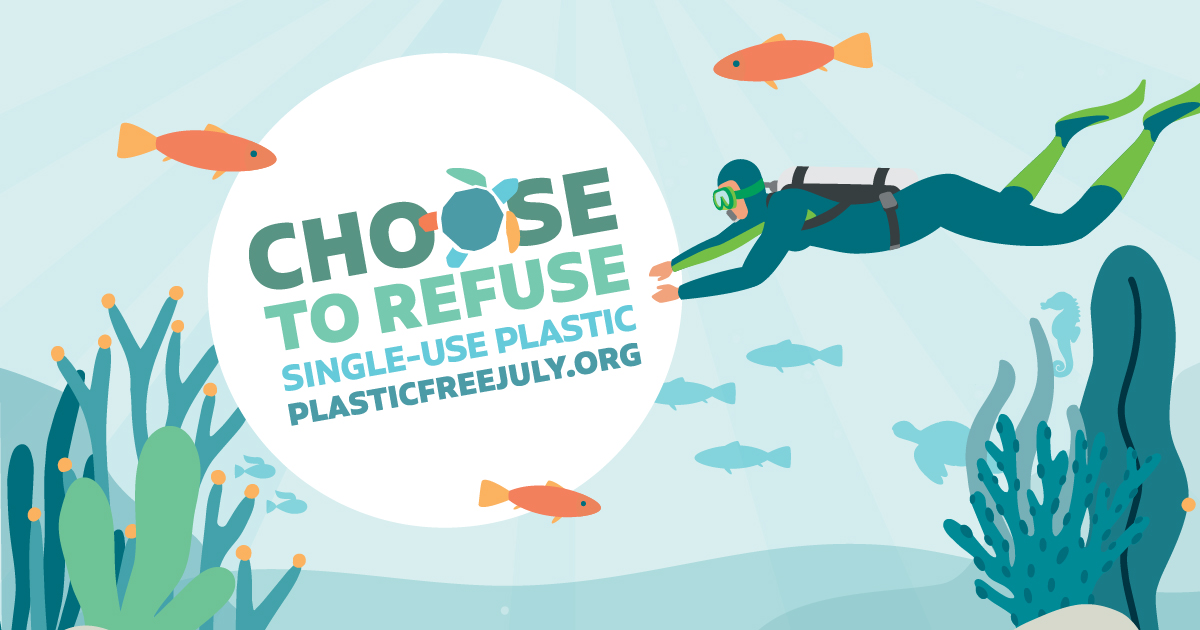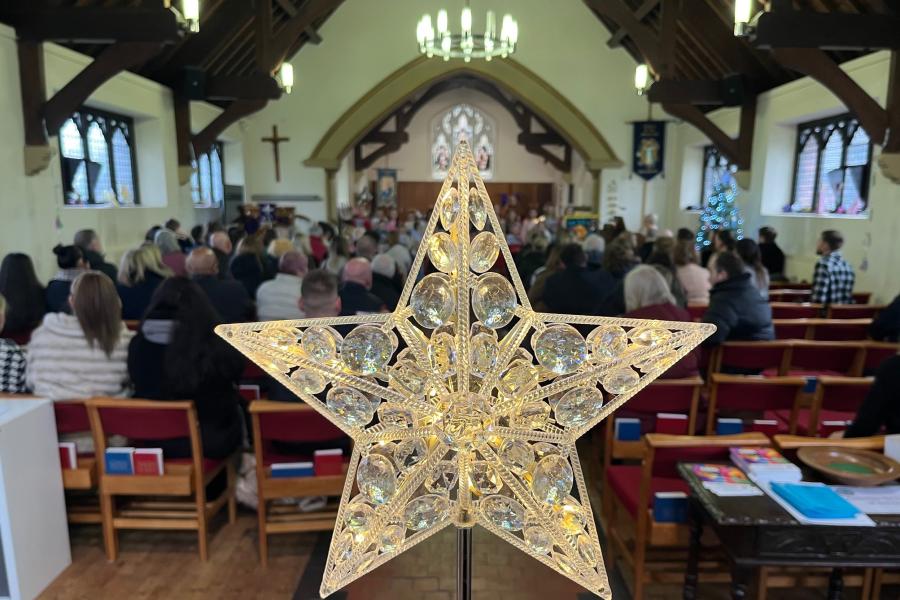
This July is Plastic Free July, a global movement that helps millions of people be part of the solution to plastic pollution – so we can have cleaner streets, oceans, and beautiful communities. Will you be part of Plastic Free July by choosing to refuse single-use plastics?
A blog from James Atkinson, Diocesan Digital Media Adviser (written in July 2021, and updated in July 2023)
Last year I started making "eco bricks"; the process of taking un-recycable flexible plastics and packing it into plastic bottles, these can then be used as building blocks around the world.
I was amazed how much plastic could fit into a 1.5L bottle (about 500g!), and I thought to myself how wonderful it would be not throwing any more plastic away to sit in landfill for centuries. The hardest part was staying on top of it! All of the plastic has to be clean, dry and cut up into smaller pieces to help pack it all into the bottles. My house soon ended up consumed by mountains of plastic!
So whilst I don’t want to put people off the idea of eco bricking (it’s actually quite therapeutic and very satisfying finishing a brick), it did really open my eyes to just how much plastic we were buying and throwing away each week. And not just the flexible plastics from food packaging, all the other plastic around the house, the office, in our lives, which we take for granted.
(Update - I've actually yet to find somewhere I can send my eco bricks!! There was a place in Worcester, but they were inundated and also weren't sure what to do with them! So I now instead take my clean soft plastics to supermarkets which accept it for recycling. Most large supermarkets should have a special bin, though not all supermarkets accept the same items)
I started reading more about plastics, watching documentaries (the War on Plastic on BBC iPlayer is worth a watch), and discovering the shocking facts on how long plastic take to decompose - 20 years for a plastic bag, 30 years for a coffee cup, and up to 1000 years for a toothbrush! If we replace our toothbrush every three or four months, this adds up to about 23 billion toothbrushes thrown away each year around the world (Source: National Geographic).
And plastics don’t really ever fully decompose, even if it claims to be "biodegradable", it just breaks down into tiny micro-plastics and end up in the oceans, our food and drink, even the air we breath. And just to make matters worse, when plastics decompose it releases methane - a greenhouse gas 28 times more powerful than carbon dioxide at warming the earth. (Source: National Geographic)
I realised that saving plastic from landfill wasn’t the answer, the answer was to try and avoid buying plastic in the first place!
There are quite a plastic free swaps I’ve made at home, some of which are really very easy to make. I’ve listed some here to help inspire you! This Plastic Free July, why not try and reduce the amount of plastic you buy. Also look out for plastic collection points at supermarkets or Terracycle collection points to save it going to landfill, or try an eco-brick!
Food
See if there is a refill shop near you and take your containers and fill them up! Some supermarkets are starting to do this too. Also remember take your own bags when shopping.
I’ve subscribed to “Oddbox” which rescues fruit and vegetables from being thrown away, either because they aren’t the “right shape” or the supermarkets had over ordered.
The app “TooGoodToGo” is also a great way of saving food from being thrown away. Last week I picked up about £20 worth of food for £3. It doesn’t solve the plastic issue, but food waste is an enormous problem with about a third of all food produced for human consumption being thrown away, oth at the supermarket and at home.
Toothbrush
I switched to a bamboo brush and will never look back! A brush which can be composted and decompose back into the earth within 4 - 6 months! If you use an electric toothbrush, have a look for recyclable heads.
Toothpaste
Regular toothpaste tubes can’t be recycled. I switched to toothpaste tablets which comes in a cardboard box, crush it up in your mouth with a bit of water until it forms a paste and then brush as normal.
Shampoo and Conditioner
I switched to a shampoo bar, no more plastic bottles and the natural ingredients are far better for your head and hair. It might take a while to get used to and to find one that suits your hair, but give it a go! Refill shops may also have liquid shampoo for you to reuse your bottles.
Toilet Roll
I subscribe to “Naked Sprout” which is totally plastic free and made from either recycled paper or bamboo. The paper is unbleached, meaning it's brown rather than the traditional white, but far more environmentally friendly. Or look out for toilet roll in paper packaging on the supermarket shelves.
Deodorant
It’s almost impossible to recycle roll on and aerosol deodorants. I switched to a natural deodorant that comes in glass jar and it’s actually the best deodorant I’ve used!
Nappies and baby wipes
Plastic disposable nappies are an environmental disaster! Obviously far more convenient, but a nappy takes up to 500 years to decompose. I can highly recommend washable, reusable nappies. They are more expensive initially, but over a few years you’ll be saving hundreds of pounds in comparison. The average baby gets through 4,000 to 6,000 disposable nappies by the time they are potty trained or perhaps 20-30 reusable nappies (Source: BBC). Even if you just swapped out a couple of nappies each day with a washable one, that makes a huge difference.
Disposable baby wipes, made from plastic, can also be avoided by using washable wipes. The same goes for any kind of wet wipe, they all contain plastic and are a nightmare if flushed down the loo!
Tea Bags and Coffee
Buy tea bags which are plastic free and biodegradable, it’s hard to believe but a lot of tea bags contain plastic!. A white teabag also means it’s been bleached, a brown, plastic free, chemical free tea bag is going to be much nicer to drink! I’ve also found coffee which comes in biodegradable packaging which can be composted at home. And always try to buy fair-trade!
Water Bottle and Coffee Cup
Resist buying bottled water! With a refillable bottle you can fill up for free from a tap and avoid the plastic waste. The same goes for coffee cups, they may look like they’re made from cardboard but they’re impossible to recycle. Some coffee houses will also offer a discount if you bring your own travel cup.
Cleaning Sprays
When buying kitchen and bathroom sprays, 90% of the liquid is just water. I’ve switched to tablets which just dissolve in water and you can just re-use your existing spray bottles. There are also recipes for homemade cleaning solutions readily available online using vinegar and lemons.
Cleaning brush
Time to buy a new cleaning brush? Look for a wooden one! I’ve got one with a replaceable brush head.
Clothes & washing bag
Washing synthetic clothing flushes millions of micro-plastics down the drain, which will eventually find their way to the oceans. Washing machines might one day have filters built in to catch them, but in the mean time you can buy a special washing bag to put your synthetics clothes in to catch the plastics.
Food wraps
Tin foil can be recycled (in some counties), but if it goes to landfill it’ll sit there forever. Foil and plastic cling film can be avoided by buying beeswax wraps. A bit pricey initially but in the long run will be cheaper and better for the planet.
"Olio"
Having a clear out and have items which you know a charity shop won’t be able to sell, but you can’t bare to send to landfill? Try using the app “Olio”. I’ve listed all kinds of things, which might have just gone in the bin, within a few hours someone has arranged to come and collect it!
What changes could you make at home, at the office or at church?
You don't need to do all this at once either, it may all seem a bit overwhelming, but every little change is going to make a difference.
If you’re making some of these changes at church, make sure you’ve signed up to become an Eco Church. There are three levels of award – gold, silver and bronze – you might find you’re achieving the first one already! More information at https://ecochurch.arocha.org.uk/ and if you need any help or support email environment@cofe-worcester.org.uk to make contact with the Diocesan Climate Crisis Group.
Follow our Climate Action in the Diocese of Worcester Facebook group!

